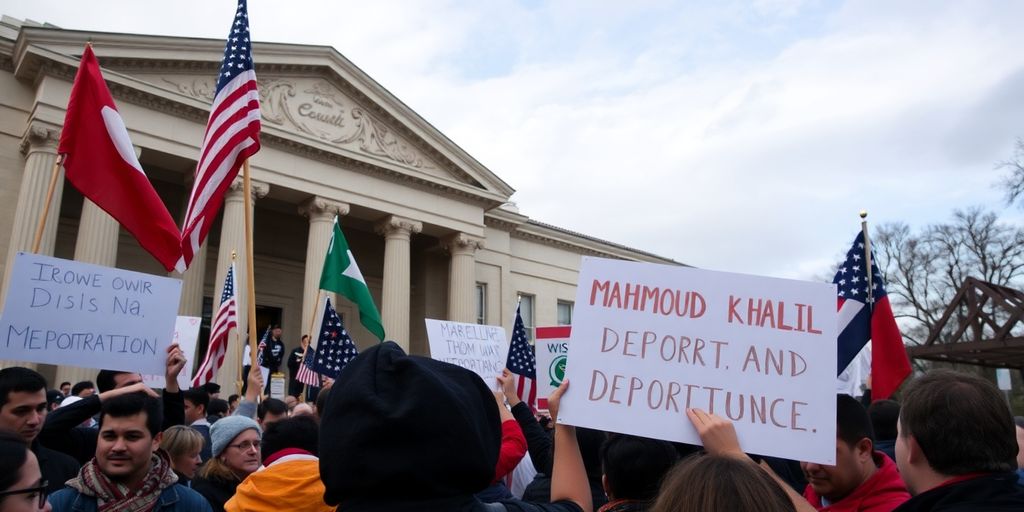Foreign Policy
U.S. Government Under Fire for Mahmoud Khalil’s Deportation Case

The U.S. government is facing intense scrutiny following a controversial ruling that allows the deportation of Mahmoud Khalil, a Columbia University activist. Khalil, a green card holder, has been detained since March 8, 2024, for his participation in pro-Palestinian protests. Critics argue that the government’s actions are an infringement on free speech and an attempt to silence dissent.
Key Takeaways
- Mahmoud Khalil, a Columbia University activist, is facing deportation due to alleged threats to U.S. foreign policy.
- The government claims his activism fosters a hostile environment for Jewish students, citing a memo from Secretary of State Marco Rubio.
- Khalil’s legal team argues that the government’s case is based on unverified claims and lacks substantial evidence.
- Protests have erupted nationwide in support of Khalil, highlighting concerns over free speech and immigration rights.
Background of the Case
Mahmoud Khalil, a 30-year-old Palestinian activist and legal permanent resident, was arrested by U.S. Immigration and Customs Enforcement (ICE) at his Columbia University housing. His detention followed his vocal opposition to U.S. policies regarding Israel and Palestine, particularly during protests against the war in Gaza.
The government has invoked a 1952 law that allows for the deportation of noncitizens if their presence is deemed to threaten U.S. foreign policy. In a memo, Secretary Rubio stated that Khalil’s activities could compromise efforts to combat antisemitism and protect Jewish students in the U.S.
Legal Proceedings
During a recent hearing, an immigration judge ruled that Khalil could be deported based on the government’s assertions. However, Khalil’s legal team has challenged the validity of the evidence presented, arguing that it relies heavily on tabloid accounts and lacks factual support.
- Key Allegations Against Khalil:
- His activism is said to create a hostile environment for Jewish students.
- He allegedly misrepresented information on his green card application.
- His presence is claimed to pose adverse foreign policy consequences for the U.S.
Khalil’s attorney, Marc Van Der Hout, has criticized the government’s reliance on a memo rather than concrete evidence, stating that the case is fundamentally about silencing dissenting voices.
Public Response and Protests
The ruling has sparked widespread protests across the United States, with supporters rallying for Khalil’s release. Demonstrators argue that the government’s actions represent a broader trend of targeting activists and suppressing free speech.
Khalil’s wife, Noor Abdalla, expressed her devastation over the ruling, emphasizing that no one should be deported for advocating for human rights. Supporters have called Khalil a political prisoner, asserting that his detention is a violation of his constitutional rights.
Next Steps
Khalil’s legal team has until April 23, 2025, to file applications for relief to prevent his deportation. They are considering various legal avenues, including asylum, as they continue to fight for his right to remain in the U.S.
The case has raised significant concerns about the implications for other international students and activists, as it sets a precedent for how the government can use immigration laws to target individuals based on their political beliefs. Khalil’s situation highlights the ongoing debate over free speech, immigration rights, and the treatment of activists in the U.S.
As the legal battle unfolds, many are watching closely to see how this case will impact the rights of immigrants and the future of political activism in America.
Sources
- US judge to rule on Columbia student’s deportation, BBC.
- Government’s case against Mahmoud Khalil is shaky and reliant on tabloid accounts, review of evidence shows, NBC News.
- Mahmoud Khalil case: Ordered to show evidence, government asserts Rubio’s authority, ABC News.
- Judge rules Columbia activist Mahmoud Khalil can be deported, ABC News.
-

 Home and Garden6 days ago
Home and Garden6 days agoTransform Your Space: A Guide to Minimalist House Interior Design in 2025
-

 Home & Family6 days ago
Home & Family6 days ago10 Essential Cleaning Hacks for Bathroom Surfaces You Need to Try
-

 Health & Fitness6 days ago
Health & Fitness6 days agoDiscovering the Best Multivitamin for Women Over 40: Essential Nutrients for Optimal Health
-

 Health & Fitness6 days ago
Health & Fitness6 days agoDiscover the Best Multivitamin for Women Over 40: A Comprehensive Guide to Optimal Health
-

 Automotive5 days ago
Automotive5 days agoUnlocking Performance: Why the HP Spectre x360 is the Ultimate 2-in-1 Laptop for 2025
-

 Crime6 days ago
Crime6 days agoExploring the Most Anticipated New True Crime Documentaries of 2025
-

 Business6 days ago
Business6 days agoMaximize Your Earnings with American Express High Yield Savings Accounts in 2025
-

 Gadgets & Electronics5 days ago
Gadgets & Electronics5 days agoTop 5 Unlocked Android Phones Under $100 for Budget Shoppers in 2025


















